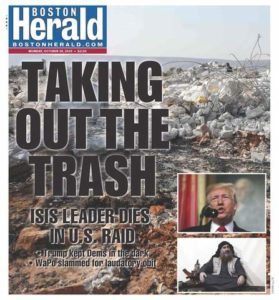The Washington Post received a lot of criticism recently for its coverage of the death of ISIS leader Abu Bakr al-Baghdadi. The newspaper’s headline read:
“Abu Bakr al-Baghdadi, austere religious scholar at helm of Islamic State, dies at 48.”
Many people, including Ivanka Trump, believed that this headline was too positive for the leader of a violent organization and that the term “terrorist” would have been more appropriate than “austere religious scholar.”
The headline was quickly changed, and an editor at the Post explained that the original headline never should have been published.
There wouldn’t be anything wrong with using the word “terrorist,” but there was nothing wrong with the Post’s choice of headline, either, and there was no need to change it. The headline captures the fact that al-Baghdadi died, the fact that he had fundamentalist religious beliefs, and the fact that he was the leader of ISIS. “Austere religious scholar” is a neutral, and factually accurate, description. It is not a compliment, nor it is an insult. It is neither positive or negative. And using neutral language is exactly what all newspapers should do.
Columnist Robert Roe at the Maysville Ledger Independent took issue with the fact that the Post published the story about al-Baghdadi’s death in the obituaries section, writing that the paper’s editors “mislead their readers with the false narrative that this animal was something akin to a diplomatic religious leader.” I’m not sure what is wrong with publishing al-Baghdadi’s death notice in the obituaries section. There’s no rule that only admirable people are allowed to have obituaries written about them. Just as newspapers should describe things using neutral language and allow readers to form their own opinions, they should also publish obituaries for a variety of public figures and allow readers to make their own judgments about which of these public figures they find admirable and which they do not.
Jesse White, a columnist at the Mesabi Daily News, went so far as to suggest that the headline should have read, “Noted scumbag, rapist, torture expert, all-around piece of [expletive] and now former ISIS leader is dead: Good riddance.” He added that a sub-heading should have told readers that al-Baghdadi “blew himself up (along with three of his kids) instead of taking a bullet to the head from a member of our special forces on Saturday because he was a psychopathic coward.”
This type of language is a perfect example of what a newspaper should not do. A newspaper should never, under any circumstances, describe a person as a “scumbag,” a “coward,” or a “piece of [expletive]’ in an article. Other than on the editorial page, the job of a newspaper is to provide facts, not opinions. Language like this is not merely opinion, it is inflammatory and personally insulting. It would be completely unprofessional and inappropriate for a newspaper article to describe a person in such insulting terms, no matter who the person is, and it is preposterous to suggest that a newspaper should do so.
No concerns about neutrality or professionalism stopped the Boston Herald from characterizing al-Baghdadi’s death as “taking out the trash” on its front page:

A newspaper should never describe anyone’s death as “taking out the trash,” no matter what horrible things the person did and no matter how widely hated the person is. Hatred for a person, whether justified or not, is an opinion, and newspapers should not express opinions (other than on the editorial page). It’s the Herald’s headline, not the Washington Post’s, that should be the target of outrage and criticism.

